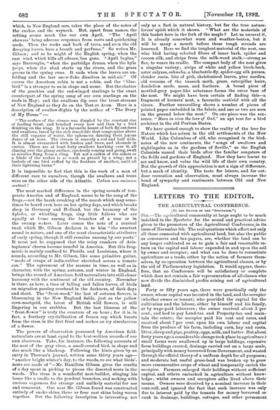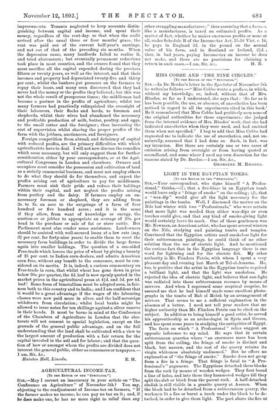LETTERS TO THE EDITOR.
THE AGRICULTURAL CONFERENCE.
LTO THE EDITOR OF THE " SPECTATOR." j SIR,—The agricultural community at large ought to be much indebted to the Spectator for the sound and practical advice given to the promoters of the Agricultural Conference.* its. issue of November 5th. The real questions which affect not only all those connected with agricultural land, but also the public- as consumers and tax-payers, are, whether the land can be- any longer cultivated so as to gain a fair and reasonable re- turn on the capital and labour expended in and upon the soil by owner and occupier ; and what can be done to resuscitate agriculture as a trade, either by the action of farmers them- selves, by co-operation between the agricultural classes, or by the aid of Parliamentary legislation. It would appear, there- fore, that no Conference will be satisfactory or complete which does not contain a fair representation of all classes who, now divide the diminished profits arising out of agricultural land.
Forty or fifty years ago, there were practically only the owner, whose capital was invested in the land, and the occupier (whether owner or tenant), who provided the capital for the cultivation and the labour, either by himself and his family, or by wage-paid labourers ; the owner received about 3 per cent., and had to pay Land-tax and Property-tax and main- tain the estate ; the occupier paid his rent and rates, and received about 7 per cent. upon his own labour and capital from the produce of his farm, including corn, hay and roots, litter, sheep and pigs, poultry, eggs, milk, and butter. But about forty years ago a considerable change took place in agriculture ; small farms were swallowed up in large holdings, expensive farm buildings erected, drainage carried out on a large scale, principally with money borrowed from Government, and wasted through the official theory of a uniform depth for all purposes ; and moderate but useful grass-land was broken up to grow more remunerative crops of wheat and temporarily enrich the occupier. Farmers enlarged their holdings without sufficient capital, and others embarked in agriculture without know- ledge ; whilst owners and occupiers alike lived above their means. Owners were deceived by a nominal increase in their rent-roll, and ignored the fact that such increase was only due to interest paid by the tenants for money borrowed or sunk in drainage, buildings, cottages, and other permanent
improvements. Tenants neglected to keep accounts distin- guishing between capital and income, and spent their money, regardless of the rent-day, so that when the audit arrived after the usual three or four months' grace, the rent was paid out of the current half-year's earnings, and not out of that of the preceding six months. When the depression came, many landlords failed to realise it, and tried abatements ; but eventually permanent reductions took place in most counties, and the owners found that they must sacrifice all the capital expended during the previous fifteen or twenty years, as well as the interest, and that their incomes and property had depreciated twenty-five and thirty per cent., whilst the bankers put pressure on the farmers to repay their loans, and many soon discovered that they had never had the money or the profits they believed ; but this was not the whole result of prosperous times ; the middleman had become a partner in the profits of agriculture, whilst too many farmers had practically relinquished the oversight of their labourers, their flocks and herds, to foremen and shepherds, whilst their wives had abandoned the necessary and profitable production of milk, butter, poultry, and eggs, to the small cotter and the foreigner ; thus increasing the cost of supervision whilst sharing the proper profits of the farm with the jobbers, auctioneers, and foreigners.
Foreign competition from abroad, and deficiency of capital with reduced profits, are the primary difficulties with which agriculturists have to deal. I will not now discuss the remedies which seem necessary, but will only suggest them for further consideration either by your correspondents, or at the Agri- -cultural Congresses in London and elsewhere. Owners and ,occupiers must consider the possession and cultivation of land as a strictly commercial business, and must not employ others to do what they should do for themselves, and expect the profits arising out of agriculture to pay for middlemen. Farmers must sink their pride and reduce their holdings within their capital, and not neglect the profits arising from poultry and the dairy. If farmers employ an un- necessary foreman or shepherd, they are adding from 2s. to 3s. an acre to the outgoings of a farm of four hundred or five hundred acres ; and it is the same if they allow, from want of knowledge or energy, the auctioneer or jobber to appropriate an average of 20s. per head in the purchase or sale of fat or store cattle. But Parliament must also render some assistance. Landowners should be assisted with well-secured loans at a low rate (say, 3',1 per cent. for forty-nine years) to enable them to erect the necessary farm buildings in order to divide the large farms again into smaller holdings. The question of a one-sided Free-trade which lowers the price of wheat by giving a bounty of 25 per cent. to Indian corn-dealers, and admits American corn free, without any benefit to the consumer, must be con- sidered on its merits. It is, indeed, a curious commentary on Free-trade in corn, that whilst wheat has gone down in price below 30s. per quarter, the 4d. loaf is now openly quoted in the market prices in the agricultural press at Md. and 5d. per 4d. loaf ! Some form of bimetallism must be adopted soon, in fair- ness both to this country and to India; and Tam confident that it would be a great advantage if the wages of the labouring -classes were now paid more in silver, and the half-sovereign withdrawn from circulation ; whilst local banks might be allowed to issue notes for ten shillings against a silver reserve in their hands. It must be borne in mind at the Conference of the Chambers of Agriculture in London that the elec- torate will not consent to special legislation, except on the grounds of the general public advantage, and on the full understanding that the land shall be cultivated with a view to the largest amount of production with a fair return for the capital invested in the soil and for labour; and that the ques- tion of how or amongst whom the profits are divided does not interest the general public, either as consumers or taxpayers.— I am, Sir, &c.,







































 Previous page
Previous page